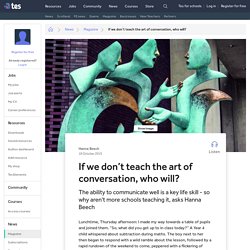

SECONDARY national curriculum Citizenship. One UN Climate Change Learning Partnership.
Behaviour. Become a better teacher using magic. A magician stands in front of a crowd, and grabs their attention with a few well-chosen words: “Are you watching closely?”

Anticipation is in the air. The magician knows that they have to keep their audience’s attention, speak at the perfect time, use the perfect words, pull off the right moves and constantly work to patch over any mistakes they might make. Quick read: Are you accidentally upsetting your adopted students? Quick listen: Why attachment-aware teaching matters for every child Want to know more? Through a mixture of misdirection, suggestion and showmanship, the spectators leave with a sense of awe. Now go back and replace “magician” with “teacher”. So why shouldn’t teachers study the masters of the magic craft for inspiration? Misdirection Misdirection is the act of distracting someone from something you don’t want them to see. How is behaviour management any different? He considered it, then responded with “Infinity?” Why did this work?
We can also misdirect in our teaching.
CPD: staff training sessions break rules of good teaching. You’d assume that one thing teachers would be good at, as professionals in the field of education, is running training sessions for their colleagues.

But, if you’ve recently been through a school Inset day, you’ll know that this isn’t always the case. What happens to all the good practice we demand for our students when we have to teach the staff? Here are some of the most common schoolboy errors when it comes to those dreaded staff CPD sessions. 1. A lack of differentiation There have been some mixed reports recently about how effective differentiation in the classroom is. Explaining the importance of effective questioning and of Bloom’s taxonomy might well be very useful for teachers in the first few years on the job. 2. Another hot-button issue in education is the amount of time in a lesson teachers should devote to explaining new ideas, before letting the students get on with things themselves.
There’s no consensus on the ideal amount of time to give to the presenter. 3. 4.
Curriculum. Creative Learning. EEF - Education Endowment Foundation. Grammar. Lesson Planning. Memory. Primary. Phonics. Reading / Language Acquisition. Resources. Target Language Policy. Teacher Training. The Art of Conversation. Lunchtime, Thursday afternoon: I made my way towards a table of pupils and joined them.

“So, what did you get up to in class today?” A Year 4 child whispered about subtraction during maths. The boy next to her then began to respond with a wild ramble about the lesson, followed by a rapid rundown of the weekend to come, peppered with a flickering of back-and-forth moments from today and last week.
Another pupil chirped in to tell me that it was her dad’s birthday. A fourth proceeded to inform me that he’d won a medal for karate last year. The next day, I sat with two children from Year 1 and their conversation turned to travel. I compared the two experiences. The answer, you are led to believe, is that this happens organically: with more practice at conversation and exposure to talking, young people will become more proficient, confident and aware of how to hold a conversation.
Yet, there is still something bothersome about the notion of “they’ll pick it up along the way”. 1. 1. Why schools should teach children how to lie. Should we teach children to lie?

At first glance, the answer seems very obvious: no. Apart from anything else, children don’t really need any encouragement to lie – they learn to do so from as young as 3 years old, when they first realise that other people are not mind readers. “Lying begins [when] children understand that they can create a false belief in someone else’s mind,” according to Dr Hannah Cassidy, a senior lecturer in forensic psychology at the University of Brighton and an expert in deception. Children first try out comically inept lies, before they slowly – infuriatingly – become adept at lying with remarkable consistency. “It’s natural,” you might think. First, learning to lie is a crucial part of a child’s cognitive development, says Angela Evans, associate professor of psychology at Brock University in Ontario, Canada.
“Lie-telling is a sign that children are gaining sophisticated cognitive skills,” she explains.
Wellbeing / School life. Welcome to the Association for Language Learning wiki to support learning languages through literary texts. - ALL Literature Project. DocuSign.